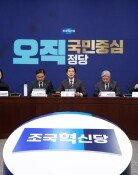Controversy over additional financial aid to Hyundai
Controversy over additional financial aid to Hyundai
Posted March. 14, 2001 13:08,
A controversy now surrounds the provision of further financial aid to three Hyundai Group companies --Hyundai Electronics Industries (HEI), Hyundai Engineering and Construction (HEC) and Hyundai Petrochemical. Banking experts said the funding could trigger another Daewoo-style crisis at a time when the conglomerate is not making much effort to streamline its operations. The domestic stock and capital markets are bearish again thanks to the deteriorating overseas market environment, which includes the U.S. stock market`s downward spiral, fears of a hard landing by the U.S. economy and an economic crisis in Japan. –Ed.
Growing uncertainty surrounding restructuring:
With the news that the government will provide additional financing to three Hyundai affiliates, foreign financial institutions with operations in Korea held an emergency meeting on Mar. 10 to discuss the situation. A representative of a foreign financial institution said the government and Hyundai creditors were likely to be grappling with the issue through next year`s scheduled presidential election. ``It is a critical moment when the government has to decide whether to save the Korean economy or the Hyundai Group,`` he said. The official noted that the politically motivated effort to reduce the immediate impact on the market was shaking the national economy.
Skepticism surrounding the government`s will to reform is also mounting. Yeo In-Taek, an analyst at Seoul Securities, said restructuring based on the market mechanism was unlikely to take place since the financial market is government-controlled. He said such suspicions prompted foreign investors to start a mass selloff of blue-chip stocks. Besides the slow pace of reform, the debt load at HEC and other Hyundai companies increases the potential for bad debts at local banks, he said, noting that the injection of more public money into the financial sphere was inevitable.
Pouring cold water onto the thawing capital market:
The growing Hyundai risk led to the sharp downturn of the Korean stock market, as well as to the freeze in the local capital market, which had showed signs of thawing. If bank loans to Hyundai Group increase, it would mean that funding to other companies would necessarily fall. Also, the Hyundai risk could eventually jeopardize the overall credit standing of Korean companies.
The Deposit Insurance Corporation is expected to issue a large volume of bonds to raise public funds, which could trigger an interest rate hike. With the growing risk associated with corporate bonds, the yield on BBB-grade corporate bonds rose by as much as 50 percent more than that on government bonds. Trading of corporate bonds also is shrinking rapidly.
Currently, investors are focusing on short-term bonds at the expense of long-term instruments. It is believed that the atmosphere in the capital market is in for a sea change.







